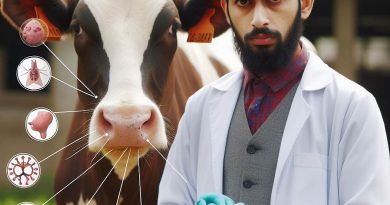Optimal Nutrition for Chickens & Turkeys
Last Updated on January 22, 2024
Introduction
Optimal nutrition plays a crucial role in the well-being and productivity of chickens and turkeys.
This blog post aims to educate readers about the importance of providing optimal nutrition to poultry.
Poultry farming is a significant aspect of the agricultural industry, and the nutrition provided to chickens and turkeys directly impacts their health, growth, and productivity.
It is crucial to ensure that these birds receive a balanced diet that meets their nutritional requirements.
Importance of optimal nutrition for chickens and turkeys
Optimal nutrition is essential for the growth and development of chickens and turkeys.
It helps maintain their overall health, supports immune function, and enhances their ability to resist diseases.
The right combination of proteins, carbohydrates, fats, vitamins, and minerals in their diet ensures optimal growth and productivity.
Additionally, providing optimal nutrition to chickens and turkeys also improves the quality of their meat and eggs.
A well-balanced diet leads to better muscle development, improved eggshell quality, and enhanced flavor and texture of the meat.
This, in turn, adds value to poultry products and benefits consumers.
Purpose of the blog post
The purpose of this blog post is to highlight the importance of optimal nutrition for chickens and turkeys and provide valuable information on how to achieve it.
We will discuss the specific nutritional requirements of these birds at different stages of their growth and provide recommendations on the best feeds and supplements to use.
By understanding and implementing optimal nutrition practices, poultry farmers can ensure the health, well-being, and productivity of their chickens and turkeys.
Stay tuned for the upcoming sections, where we will delve deeper into the specific nutritional needs of these birds and explore practical tips for achieving optimal nutrition.
Nutritional Requirements for Chickens
Essential nutrients for chickens
- Proteins
- Carbohydrate
- Fats
- Vitamins and minerals
Chickens require a balanced diet in order to maintain optimal health and productivity.
This means providing them with a variety of essential nutrients, including proteins, carbohydrates, fats, vitamins, and minerals.
Amounts and ratios of nutrients needed
Chickens have specific requirements for each nutrient, and it is important to provide them in the correct amounts and ratios.
This ensures that the chickens are able to grow, develop properly, and produce high-quality eggs or meat.
Sources of nutrition for chickens
There are several sources of nutrition available for chickens, including commercial feeds, natural food sources, and supplements.
Each source has its own benefits and can contribute to the overall health and well-being of the chickens.
Commercial feeds
Commercial feeds are specifically formulated to meet the nutritional needs of chickens.
They are convenient and provide a balanced diet that contains all the essential nutrients in the right proportions.
These feeds are available in different forms, including pellets, crumbles, and mash, depending on the age and type of chickens.
Natural food sources
In addition to commercial feeds, chickens can also obtain nutrition from natural food sources.
This includes foraging for insects, worms, and grass in outdoor environments.
It is important to ensure the chickens have access to a varied and safe environment, where they can find natural food sources to supplement their diet.
Supplements
Supplements can be used to enhance the nutrition provided to chickens.
This includes adding vitamins, minerals, or other additives to their feed.
Supplements should be used under the guidance of a veterinarian or poultry nutritionist to ensure they are appropriate and beneficial for the chickens.
Overall, providing optimal nutrition for chickens is essential for their overall health and productivity.
This involves understanding the essential nutrients they require, the amounts and ratios needed, and the various sources of nutrition available.
By ensuring a balanced diet, including commercial feeds, natural food sources, and appropriate supplements, chicken owners can promote optimal growth, development, and egg or meat production in their flock.
Read: Starting a Poultry Farm: Essential Steps & Tips
Nutritional Requirements for Turkeys
Differences in nutritional needs compared to chickens
Turkeys have different nutritional requirements compared to chickens.
Due to their larger size, turkeys require higher levels of nutrients to support their growth and overall health.
They also have specific nutritional needs that differ from chickens.
Specific requirements for turkeys
High protein levels are essential for turkeys.
Protein provides the necessary amino acids for proper muscle development, especially in growing turkeys.
Turkeys require a diet with sufficient protein content to support their rapid growth rate.
Calcium and phosphorus are crucial nutrients for turkeys’ bone health.
These minerals play a significant role in bone development and strength.
Turkeys need an adequate supply of calcium and phosphorus in their diet to prevent skeletal disorders and ensure strong skeletal structure.
In addition to protein, calcium, and phosphorus, turkeys have specific vitamin and mineral considerations.
Vitamins, such as vitamin A, vitamin E, and vitamin K, are essential for the overall health and immune function of turkeys.
Minerals, including iron, zinc, and selenium, are also important for various bodily functions.
Feed options for turkeys
When it comes to feeding turkeys, there are several options available.
Pelleted feeds are a popular choice as they are convenient and provide a balanced nutrition profile.
Pellets contain a blend of various ingredients, including grains, protein sources, vitamins, and minerals.
Mash feeds are another option for feeding turkeys. Mash feeds consist of ground ingredients that turkeys can easily consume and digest.
This type of feed allows turkeys to selectively consume the nutrients they need, promoting optimal health and growth.
Some farmers prefer making homemade feed mixtures for their turkeys.
This allows them to have better control over the ingredients and quality of the feed.
Homemade mixtures can be formulated using a combination of grains, protein sources, and essential supplements.
Ultimately, turkeys have specific nutritional requirements that differ from chickens.
They need high levels of protein, as well as calcium, phosphorus, vitamins, and minerals, to support their growth and health.
Farmers have various feed options to choose from, including pelleted feeds, mash feeds, and homemade feed mixtures.
Read: Poultry Health: Preventing Common Diseases
Common Nutritional Deficiencies
Chickens and turkeys require a well-balanced diet to maintain optimal health and productivity.
Nutritional deficiencies can have significant impacts on their overall well-being and performance.
It is crucial for farmers and poultry owners to understand the common deficiencies and their associated symptoms to provide the necessary dietary adjustments and prevent serious health issues.
Symptoms of nutritional deficiencies in chickens and turkeys
- Weight loss or stunted growth
- Poor feather quality and coloration
- Reduced egg production and fertility
- Weakness and lack of energy
- Increased susceptibility to diseases and infections
The symptoms of nutritional deficiencies in chickens and turkeys can range from mild to severe, but they all affect the birds’ overall health and productivity.
Weight loss and stunted growth are common signs that the birds are not receiving adequate nutrients.
Additionally, poor feather quality and coloration indicate a lack of essential proteins and vitamins in their diet.
Lack of protein
- Reduced muscle development and poor body condition
- Delayed or abnormal feather growth
- Decreased egg production and quality
- Weaker immune system and increased vulnerability to diseases
Protein is an essential component of poultry nutrition, and a lack of it can lead to various problems.
Chickens and turkeys require protein for muscle development, feather growth, and egg production.
When protein is insufficient, the birds may experience delayed feather growth, decreased egg production, and weakened immune systems, making them more susceptible to diseases.
Inadequate vitamins and minerals
Vitamin deficiency symptoms include:
- Slow growth and development
- Poor feather and skin condition
- Reduced immune function
- Reproductive disorders
Mineral deficiency symptoms include:
- Weak bones and skeletal deformities
- Reduced eggshell quality and thickness
- Lowered resistance to diseases and parasites
- Abnormal feather growth and feather pecking behavior
Vitamins and minerals play a crucial role in maintaining the health of chickens and turkeys.
Vitamin deficiencies can result in slow growth, poor feather and skin condition, and reproductive disorders.
Similarly, mineral deficiencies can cause weak bones, reduced eggshell quality, and compromised disease resistance.
Both of these deficiencies can have long-term negative consequences if not addressed promptly.
Insufficient carbohydrates or fats
- Lack of energy and decreased activity levels
- Poor growth and development
- Weakened immune system and increased vulnerability to diseases
- Reduced egg production and quality
- Impaired reproductive performance and fertility
Inadequate carbohydrates or fats can also have detrimental effects on poultry.
These nutrients provide essential energy for bodily functions, growth, and reproduction.
Insufficient intake can lead to decreased activity levels, poor growth, and weakened immune systems.
Additionally, it can negatively impact egg production and reproductive performance in both chickens and turkeys.
To ensure optimal nutrition for chickens and turkeys, farmers and poultry owners must provide a well-balanced diet that meets their specific nutritional requirements.
This includes a sufficient amount of protein, vitamins, and minerals, as well as an appropriate balance of carbohydrates and fats.
Regular monitoring of the birds’ health and performance is essential to identify any signs of nutritional deficiencies and make timely dietary adjustments.
In summary, common nutritional deficiencies in chickens and turkeys can have significant impacts on their health and productivity.
Recognizing the symptoms of these deficiencies, such as weight loss, poor feather quality, decreased egg production, and weakened immune systems, is crucial for proactive dietary management.
By addressing these deficiencies through proper nutrition, poultry owners can ensure the overall well-being and performance of their flocks.
Read: Poultry Health: Preventing Common Diseases

Feeding Strategies for Optimal Nutrition
Age-specific feeding guidelines
- Provide starter feeds for chicks and poults to support their rapid growth and development.
- Introduce grower feeds for young birds to meet their increasing nutritional requirements.
- Switch to layer feeds once chickens reach maturity to support egg production.
- Use specific turkey feeds tailored to different stages, such as poults, hens, or toms.
Balancing nutritional needs with natural foraging behaviors
While it’s important to provide a balanced diet, it’s also essential to allow chickens and turkeys opportunities to exhibit their natural foraging behaviors.
Free-range and pasture-feeding considerations
When implementing free-range or pasture feeding, keep the following considerations in mind:
- Ensure access to a diverse range of plants, insects, and worms to supplement their diet.
- Monitor for nutritional deficiencies and adjust the supplemental feed provided accordingly.
- Consider the impact of seasonal changes on forage availability and adjust the feeding program accordingly.
- Provide appropriate shelter and protection from predators to ensure the safety and well-being of the birds.
Implementing these feeding strategies will help you optimize the nutrition of your chickens and turkeys, promoting their health and productivity.
Read: Robotics in Poultry Farming: The Future Is Here
Conclusion
Recap of the importance of optimal nutrition
In closing, it is crucial to provide chickens and turkeys with optimal nutrition to ensure their health and productivity.
By understanding their nutritional requirements, farmers can provide balanced diets that meet their needs and promote growth.
Key takeaways for providing optimal nutrition for chickens and turkeys
Key takeaways include the significance of protein, vitamins, minerals, and water in their diets.
Encouragement to further research and consult with experts in poultry nutrition
Consulting with poultry nutrition experts and conducting further research can provide valuable insights and help farmers make informed decisions regarding their flock’s nutrition.
Remember, a well-nourished flock leads to better overall performance and profitability in the poultry industry.


